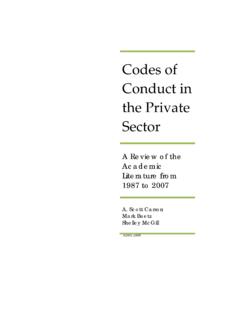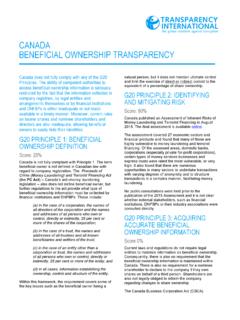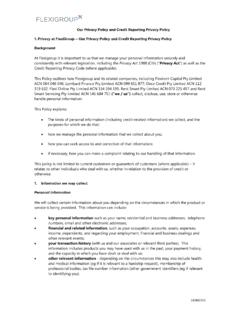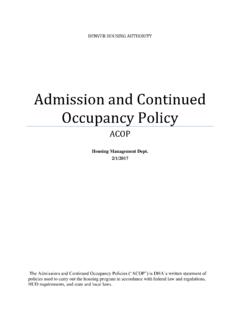Transcription of Accommodating Medical Marijuana in the Workplace
1 Accommodating Medical Marijuana in the Workplace by Parisa Nikfarjam RUBIN THOMLINSON LLP. Employment Lawyers Background on Medical Marijuana The Ontario Court of Appeal agreed, and in a landmark ruling struck down the offending legislation. In How did possession of Marijuana become legal doing so, it called on the federal government to enact for Medical use? laws that permitted individuals to possess and use On July 31, 2000, the Ontario Court of Appeal ruled Marijuana for medicinal purposes. that a total prohibition on Marijuana possession was In response, Parliament introduced the Marihuana Medical Access Regulations ( MMAR )2 in 2001. The MMAR. In that case, the accused suffered from epilepsy and was the governing framework for medicinal Marijuana experienced frequent and severe seizures. While his until it was replaced by the Marihuana for Medical attempts to control those seizures with conventional Purposes Regulations ( MFMPR )3 on April 1, 2014.
2 Medication were only moderately successful, the accused found that he could substantially reduce the Marijuana Cultivation incidence of seizures by smoking Marijuana . However One of the major differences between the MMAR and because he could not locate a lawful source of the drug, the MRMPR regulatory regimes is with respect to the he grew his own. production of Marijuana . The accused was charged with cultivating and Under the old MMAR regime, a centralized federal possessing Marijuana . Given its purported therapeutic regulator issued licenses to produce that allowed effects, he argued that now-repealed federal legislation patients to grow plants at home. However under the that placed a total prohibition on Marijuana possession MFMPR regime, patients must obtain a prescription from violated his Charter of Rights and Freedom's right to a Medical doctor and then purchase Marijuana from liberty and security of the person.
3 A licensed producer. The MFMPR expressly prohibits growing Marijuana in one's own home. 1. R v Parker (2000), 49 OR (3d) 481. 2. SOR/2001-227, [ MMAR ]. 3. SOR/2013-119, [ MFMPR ]. Canadian Centre for Ethics and Corporate Policy 1. The MFMPR was recently challenged on the grounds that Medical Efficacy of Medical Marijuana the prohibition against growing Marijuana for personal Despite the above-noted ruling from the Ontario Court use would impose financial hardship to such a degree of Appeal, the Medical efficacy of Marijuana remains that patients would be required to choose between their controversial. In a recent interview, the President of prescribed Marijuana dosage or other life necessities. the Canadian Medical Association reiterated that the [CMA's] stand has always been that there is insufficient On March 21, 2014, the Federal Court granted the scientific evidence to support the use of Marijuana for applicants an interim injunction exempting them from clinical purposes.
4 The MFMPR's provision that repealed personal production licenses. Unless the injunction is appealed, the exemption In 1999, an extensive analysis was released from an eleven- will remain in place until the issue is decided at member expert panel at the Institute of Medicine, which was ordered and financed by the White House Office of Authorization to possess National Drug Control Policy. The study confirmed the Another significant change between the two regimes effectiveness of Marijuana in treating nausea, pain and has to do with how authorization for accessing Medical weight loss associated with AIDS, but found that the Marijuana is obtained. benefits for glaucoma patients were limited and of short duration. The study also failed to find evidence that The MMAR contained a list of conditions and symptoms Marijuana had an effect on symptoms of Parkinson's that would qualify a person for Medical Marijuana .
5 Disease or Huntington's disease, although it did appear to For example, the MMAR considered the following to be alleviate muscle spasms associated with Category 1 symptoms that presumed entitlement to Medical Marijuana : Since then, studies have been released which found Marijuana to be effective in treating non-cancer pain, Symptom Associated Medical Conditions such as neuropathic pain, fibromyalgia, rheumatoid arthritis and mixed chronic Severe nausea Cancer, AIDS/HIV infection Cachexia, anorexia, Cancer, AIDS/HIV infection What Does This Mean for Employers? weight loss Persistent muscle Multiple sclerosis The Issue spasms Given that individual doctors, rather than a centralized Seizures Cancer, AIDS/HIV infection, regulator, will now issue prescriptions under the multiple sclerosis new MFMPR regime, there is a strong likelihood that Severe pain Cancer, AIDS/HIV infection, Medical Marijuana will become far more prevalent spinal cord injury or disease, than in the past.
6 Combined with the fact that many severe form of arthritis provincial workers' compensation regimes will reimburse expenses related to Medical Marijuana , 8. Under this regime, the patient's doctor submitted a form employers must prepare for the reality of Marijuana in describing the patient's Medical condition and forwarded the Workplace . it to the federal government for ministerial approval. This would result in a license to possess, and if also requested, a Central to this issue are two competing duties: namely, license to produce certain amounts of Marijuana . the duty to accommodate under human rights and The MFMPR limits the federal government's role to workers' compensation legislation, and the duty to take licensing large-scale Marijuana producers. Individual every precaution reasonable in the circumstances for the doctors are now responsible for determining whether protection of a worker under occupational health and Medical Marijuana is the appropriate treatment to safety legislation.
7 Prescribe. As there is disagreement among doctors about the Medical efficacy of Marijuana , observers are expecting Duty to Accommodate this change to lead to widely divergent criteria for issuing The duty to accommodate under human rights a legislation exists to relieve the adverse impact from when a Workplace rule ( no drugs at work) conflicts with a prohibited ground of discrimination ( disability due to epilepsy). 4. Neil Allard et al v. Her Majesty the Queen in Right of Canada, 2014 FC 280 (unreported, retrieved from: ). 5. Brian Owens, Be wary of prescribing' Medical Marijuana , CMA wans , online: (2014) Can Med Assoc J. < >. 6. Ibid. 7. Mary E. Lynch and Fiona Campbell, Cannabinoids for treatment of chronic non-cancer pain; a systematic review of randomized trials , online: (2011) Br J Clin Pharmacol < >. 8. Ontario's Workplace Safety and Insurance Appeals Tribunal has reimbursed expenses relating to Medical Marijuana since approximately 2008.
8 There are limits, however; in one case the Tribunal ruled that a worker cannot be granted $300,000 to purchase a house because his apartment was unsuitable for growing Marijuana (see 2012 ONWSIAT 908). Canadian Centre for Ethics and Corporate Policy 2. To this end, adjudicators will ask whether discrimination Similarly, employers must recall that a perceived disability based on a prohibited ground has occurred, and if so, is as much a ground of discrimination as the actual whether the discrimination was justified. Generally disability itself. This means that employers should be speaking, discrimination will only be justified if providing cautioned from making stereotypical assumptions about accommodation would result in undue hardship . the abilities of an employee who has been prescribed Medical Marijuana . While some assumptions may be In the case of Medical Marijuana or any other valid where safety is a concern (such as driving), it may be prescription drug for that matter employers must improper to, for example, diminish an employee's duties remember that the treatment for a disability cannot based solely on assumed impairment.
9 Be divorced from the disability itself. This means that Accommodating the disability That being said, a prescription extends to making allowances for Medical Marijuana is not a for the prescribed course of license for undue impairment In the case of at work. If an employee cannot Marijuana , common effects perform his or her functions in include increased appetite, employers should be a safe and acceptable manner impaired motor skills, reduced short-term memory and difficulty cautioned from making while using Marijuana (or any prescription medication for that with concentration. In some stereotypical assumptions matter), then further discussion users, Marijuana can also cause acute anxiety or panic attacks. about the abilities of must be had on whether that person should be returning to an employee who has work at all. The issue of Medical Marijuana was dealt with tangentially been prescribed Medical Occupational Health in the British Columbia case Marijuana .
10 And Safety of Wilson v. Transparent Glazing Cast against an employer's Systems The complainant, duty to accommodate the Mr. Wilson, had a license to use of Medical Marijuana , is consume Medical Marijuana for the obligation to take every relief of chronic back pain and precaution reasonable in the migraine headaches. He alleged that the termination of circumstances for the protection of a worker. Generally his employment with the respondent contractor was due speaking, this duty requires employers to identify to his disability. potential Workplace hazards and to take proactive steps to minimize a worker's exposure to these hazards. The respondent claimed that Mr. Wilson frequently argued with the site foreman, was aggressive toward What hazards might be posed by an employee who uses coworkers and generally acted in an unprofessional Medical Marijuana at work? Depending on the Workplace , manner. A fax from a Project Superintendent to the an employee's impairment may pose a risk to coworkers President and owner of the contractor ultimately led to as well as to the employee him/herself.






